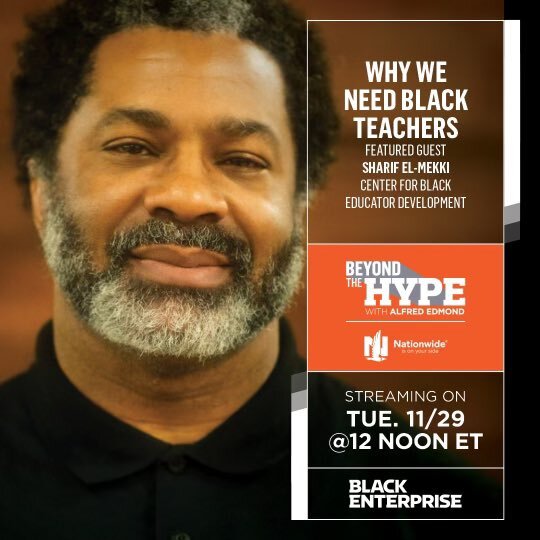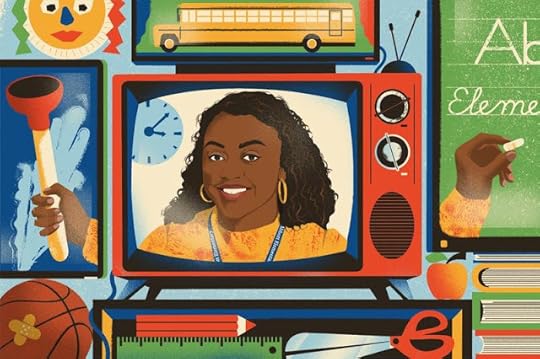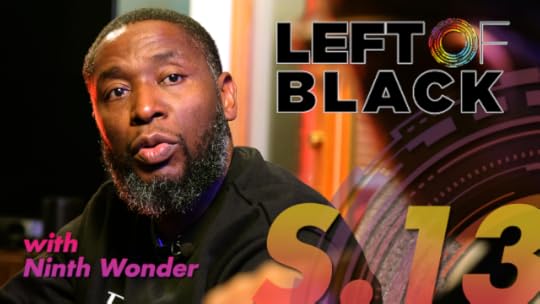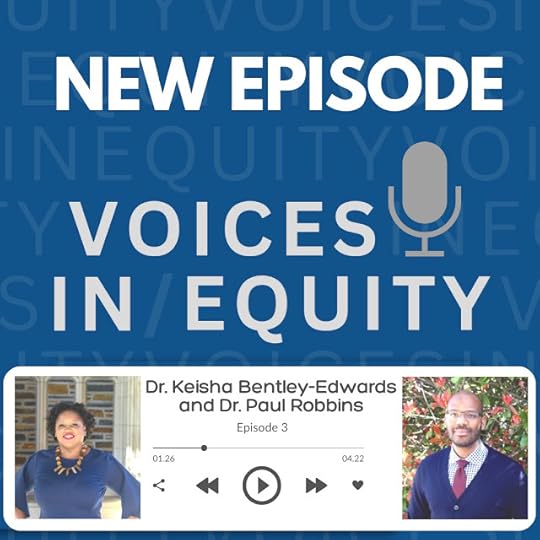Mark Anthony Neal's Blog, page 32
December 4, 2022
Beyond The Hype with Alfred Edmond, Jr.: Why We Need Black Teachers

'The scarcity of Black educators today can ironically be traced back to the landmark 1954 Brown v. Board of Education decision outlawing segregation in public schools, which led to the effective elimination of Black teachers. Center for Black Educator Development CEO Sharif El-Mekki joins Beyond The Hype to share how creating pipelines and anti-racist cultures for Black educators is key to achieving equity in education for Black students.'
Director Dr. Rachel Raimist Who Left Higher Ed to Pursue Her Dreams in Film | Queen Sugar | OWN

'Meet Dr. Rachel Raimist who directed episode 11 in season 3 of Queen Sugar. She shares how she had to be brave in leaving higher education as a professor to pursue her career as a Director in film.'
Helga: Claudia Rankine

"There are times in life when you need to be able to live in the vision, where you are making a leap of faith into something unknowable."
'Claudia Rankine is a professor of the Creative Writing Program at New York University, a recipient of fellowships from the MacArthur, Guggenheim, and National Endowment of the Arts, and one of the most celebrated writers of our time. In this episode of Helga, Rankine talks about who holds the power in our democracy and what it means to earn a mother’s understanding of your work. She also reveals her superpower and the advice she would offer everyone who looks for fresh inspiration.'
The New Yorker Radio Hour: Quinta Brunson, a “Child of the Internet,” Revives the Sitcom

'Quinta Brunson made a name for herself as a master of meme comedy and is a self-described “child of the Internet,” yet her ABC mockumentary series Abbott Elementary is an unabashed throwback to the sitcoms of her youth. Doreen St. Félix talked with Brunson at the 2022 New Yorker Festival about her influences and the everyday comedy of the workplace. St. Félix believes that Brunson has found “freedom in formula” when it comes to “Abbott,” which documents the lives of the beleaguered staff at a Philadelphia public school. “There is nothing that I could do,” Brunson says, “or [that] anyone can do that is more triumphant than someone going to their shitty job.” Writing in the wake of shows like Black-ish, Brunson relishes being able to center her story on Black people without addressing topical issues about race; the school is its own self-enclosed world. Just surviving, she thinks, provides its own form of liberation. “So much has happened to Black people,” she says. “Why are we still here? . . . We really could have called it quits a long time ago, and somehow we just keep going. It’s crazy to me”.'
Black (Twitter) Power

'In October of 2022, a young Black woman named Shanquella Robinson went on vacation in Mexico with a group of friends. She never came home. The circumstances surrounding her death were suspicious, but there was little movement on any investigation – until Black social media users helped her story go viral. Now, the FBI has opened an investigation and Mexican authorities have issued an arrest warrant for a suspect. Robinson’s mother has credited the sustained attention that "Black Twitter" and other online spaces have had on the story. And this is not the first time that Black social media users have exercised their online power to create social change offline. The Takeaway speak with Meredith Clark, associate professor of journalism and communication studies and founding director of the Center for Communication, Media Innovation and Social Change at Northeastern University. Professor Clark is involved in Archiving the Black Web and writes and researches on the power of Black digital activism.'
December 1, 2022
Left of Black S13 · E7 | Hip-Hop Producer Ninth Wonder

In this special episode of Left of Black, host and Duke University Professor Dr. Mark Anthony Neal sits down with legendary hip-hop producer and long-time friend, Patrick "Ninth Wonder" Douthit to discuss his legacy in the music industry and his professorship at Duke University and beyond. From rap icon Pete Rock and old school hip-hop to the state of women's basketball to Douthit's new sneaker line from Nike, the two men touch on multiple topics during a visit to Douthit's recording studio near Downtown Raleigh, NC.
Voices in Equity: How Systemic Racism and Preexisting Conditions Contributed to COVID-19 Disparities for Black Americans

'On this episode of Voices in Equity, Dr. Keisha Bentley-Edwards and Dr. Paul Robbins discuss their chapter on systemic racism and how it manifests in different ways and settings, especially furthering the impact of COVID-19 on inequality. Bentley-Edwards and Robbins also discuss the social determinants of health, which are the social factors that influence one’s health. These can be things like policies, social services, and everyday interactions. It is important to consider social determinants when thinking about racial differences, as race is a social construct. Social determinants can have a big impact on one’s health, and oftentimes these differences are preventable.'
Family History, Gene Variants Put Black Men at Risk for Early Prostate Cancer

Family History, Gene Variants Put Black Men at Risk for Early Prostate Cancer
Identifying risk factors could help reduce racial disparities in outcomes
DURHAM, N.C. – A family history of cancer and genetic variants that might be inherited appear to be important risk factors for Black men diagnosed with early-onset prostate cancer, a study involving Duke Health researchers has found.
Kathleen Cooney, M.D., chair of the Duke Department of Medicine, is the senior author of the study appearing online on Nov. 29 in the journal JCO Precision Oncology.
Genetic studies usually recruit non-Hispanic White men, despite data showing that Black men are disproportionately affected by prostate cancer and more than twice as likely to die from the disease compared to their White counterparts.
Researchers looked to address this health disparity by identifying genetic variants in Black patients diagnosed with early-onset prostate cancer.
They sequenced germline DNA of 743 Black men diagnosed with prostate cancer at 62 years old or younger. This is DNA found in the men’s sperm cells, meaning it would contain genetic changes that could be passed on to a child.
The focus was on DNA damage repair genes and HOXB13, a gene Cooney’s research team found to be associated with hereditary prostate cancer in White men. Researchers identified 26 variants in 14 genes that could cause disease among 30 men, approximately 4% of the patients studied.
“We completed sequencing at Duke and our results reveal that men who had certain genetic variants were more likely to have a close relative diagnosed with cancer, have a higher prostate-specific antigen at time of diagnosis, and have more severe cases,” Cooney said.
“We need to take a closer look at genetic associations to learn more about the susceptibility Black men have to developing prostate cancer,” Cooney said. “This could potentially reduce health disparities.”
The reason for poor outcomes among Black men diagnosed with prostate cancer includes both biological and societal causes, such as access to health care. Data from a previous study reveals genetic make-up may account for up to 40% of all prostate cancer cases.
“November is Men's Health Awareness Month and it’s our hope that these findings help Black men become more aware of their susceptibility to early-onset prostate cancer,” Cooney said. “If men know they have a family history of cancer, it’s important to talk to a doctor and consider genetic testing. If they end up having a mutation, they’re encouraged to have cancer screenings earlier and more frequently.”
+++
Additional authors of the study include Matthew Trendowski, Christopher Sample, Tara Baird, Azita Sadeghpour, David Moon, Julie Ruterbusch, and Jennifer Beebe-Dimmer.
The study received funding support from the Department of Defense (W81XWH-16-1-0713) and the National Institutes of Health (3T32 HG008955-04S1).
@font-face {font-family:Helvetica; panose-1:0 0 0 0 0 0 0 0 0 0; mso-font-charset:0; mso-generic-font-family:auto; mso-font-pitch:variable; mso-font-signature:-536870145 1342208091 0 0 415 0;}@font-face {font-family:"Cambria Math"; panose-1:2 4 5 3 5 4 6 3 2 4; mso-font-charset:0; mso-generic-font-family:roman; mso-font-pitch:variable; mso-font-signature:3 0 0 0 1 0;}@font-face {font-family:Calibri; panose-1:2 15 5 2 2 2 4 3 2 4; mso-font-charset:0; mso-generic-font-family:swiss; mso-font-pitch:variable; mso-font-signature:-536859905 -1073732485 9 0 511 0;}p.MsoNormal, li.MsoNormal, div.MsoNormal {mso-style-unhide:no; mso-style-qformat:yes; mso-style-parent:""; margin:0in; mso-pagination:widow-orphan; font-size:12.0pt; font-family:"Calibri",sans-serif; mso-ascii-font-family:Calibri; mso-ascii-theme-font:minor-latin; mso-fareast-font-family:Calibri; mso-fareast-theme-font:minor-latin; mso-hansi-font-family:Calibri; mso-hansi-theme-font:minor-latin; mso-bidi-font-family:"Times New Roman"; mso-bidi-theme-font:minor-bidi;}.MsoChpDefault {mso-style-type:export-only; mso-default-props:yes; font-family:"Calibri",sans-serif; mso-ascii-font-family:Calibri; mso-ascii-theme-font:minor-latin; mso-fareast-font-family:Calibri; mso-fareast-theme-font:minor-latin; mso-hansi-font-family:Calibri; mso-hansi-theme-font:minor-latin; mso-bidi-font-family:"Times New Roman"; mso-bidi-theme-font:minor-bidi;}div.WordSection1 {page:WordSection1;}
November 29, 2022
A Peerless Genius: Michael Jackson’s ‘Thriller’ by Mark Anthony Neal

A Peerless Genius: Michael Jackson’s ‘Thriller’
by Mark Anthony Neal | @NewBlackMan | NewBlackMan (in Exile)
Michael Jackson was fifteen years into a professional singing career when Thriller was released on November 30, 1982, but nearly a decade past his peak years as the boy lead singer of his family group, The Jackson Five. Not yet aged 25, Jackson could have easily become another child-star as cultural footnote—much like his temporal peer Donny Osmond was at the time. And indeed in the years between Jackson’s star-turn as the Scarecrow in The Wiz (1978)—a soulful adaptation of The Wizard of Oz—and the release of Thriller, Jackson worked hard to craft an image of an independently minded adult who, removed from the comforts of his family clan, the assembly-line logic of the Motown label and the overbearing influence of family patriarch Joe Jackson, was now in control of his life and, more importantly, his music. What may have begun as simply a stab at independence, eventually became a stab at history; Thriller remains one of the biggest selling recordings in the history of the music industry.
Critical acclaim for Thrillerwas immediate. In the pages of the Sunday New York Times (December 19, 1982), John Rockwell wrote that "Thriller is a wonder pop record, the latest statement by one of the great singers in popular music today. It is as hopeful a sign as we have had yet that the destructive barriers that spring up regularly between white and black music – and between whites and blacks –in this culture may be breached once again." Yes, Michael Jackson as unwitting Race Man. Thriller’s lead single “The Girl is Mine” featured Paul McCartney in what was a calculated appeal for crossover success and pop gravitas, on Jackson’s part. The significance of this collaboration was not lost on critics. In a Newsweek piece titled "The Peter Pan of Pop" (January 10, 1983), Jim Miller noted that the song "sounds very pretty and perfectly innocuous—until you begin to think about the lyrics. Have American radio stations ever before played a song about two men, one black and the other white, quarreling over the same woman?" Recorded a year after McCartney and Stevie Wonder broke barriers with “Ebony & Ivory” and nearly two years to the anniversary of John Lennon 's murder, the collaboration with McCartney gave Jackson instant credibility among "serious" pop audiences.
But crossover strategies and Jackson’s own pop appeal would mean little if not for the sonic landscape that producer Quincy Jones created for Jackson. It was during the filming of the 1978 film The Wiz that Michael Jackson and Quincy Jones, the film’s executive producer, laid the groundwork for the productive and profitable professional relationship that transformed Jackson into global pop star. Jones' brew of sophisticated and subtle pop-jazz—a sound he brilliantly mined on his own albums Body Heat (1974), Sounds…And Stuff Like That (1978) and the award-winning The Dude (1981)—provided Jackson with a mature, yet youthful style. Jackson and Jones initially collaborated on Jackson’s Off the Wall (1979) —arguably the best album in Jackson's oeuvre—creating signature pop confections like "Don't Stop 'Till You Get Enough", "Rock with You" and the title track.
Though Jones might have helped Jackson to sound grown-up, Jackson’s naivete helped ingratiate him to audiences. In the aforementioned Newsweek article Quincy Jones describes Jackson as having a "balance between the wisdom of a 60-year-old”— not surprising for a young man who had worked intimately with Berry Gordy, Kenneth Gamble, Leon Huff and Jones — “and the enthusiasm of a child." Jackson's childlike demeanor (the soft voice) and somewhat androgynous (and Jerri-curled) features made him user friendly for a generation of American and later global children, who viewed Jackson as a Peter Pan figure. Jackson played off on his child-like sensibilities most brilliantly in the video for the title track. "Thriller" was the fourth release (a year after the initial release) from the project and featured a cameo by the late Vincent Price. Written by Rod Temperton, who penned songs on both Thriller and Off the Wall, “Thriller” was recorded as a tribute to Jackson's love of horror movies. Employing the talents of veteran film director John Landis (American Werewolf in London and Trading Places) Jackson created the first "music video as event"— a half-hour long film short that directly referenced Night of the Living Dead (1968) and a host of other horror flicks.
Thriller’s success owed as much to Jones’s production as it was Jackson’s desire for cinematic presentations of his music. With each music video beginning with “Billie Jean” and then “Beat It”, Jackson upped the artistic ante—these were postmodern spectacles in a form of presentation that was still grappling with its own possibilities. Jackson’s seamless presentation of (musical) text and image was cutting edge and spoke powerfully to the historic relationship between blackness and technology—indeed Black bodies were often literally the technology that cut the edge. Decades later it’s difficult to hear Jackson's "hee, hee, hee" over Paul Jackson's signature baseline on “Billie Jean” and not envision the "Blade Runner" style video that was shot in support of the song. That said, I still argue that the purest form of genius on the Thriller is the opening track "Wanna Be Startin' Somethin'".
“Wanna Be Startin’ Somethin’” marries Jackson's boyish exuberance with a complex rhythmic structure that propels the song into an ethereal exorcism of funk. As the song rumbles towards its close, Jackson seemingly summons the gods, delivering a sermonic spectacle worthy of the greatest Black preachers ("Lift your head of high and scream out to the world / I know I am someone and let the truth unfurl / No one can hurt you now, because you know what's true / Yes I believe in me, So you believe in me"). The song soars when Jackson yelps (literally, out of breath) "help me sing it" at which point the legendary backing group The Waters (Julia, Maxine and Oren) chime in rhythmically "ma, ma, se, ma, ma, sa, ma, ma coo, sa." These utterances were appropriated from Cameroonian saxophonist Manu Dibango's classic "Soul Makossa" (1973). Jackson ad-libs behind the Waters when suddenly the bottom drops out, and listeners are left with Jackson (damn near orgasmic), the still frenzied Waters, the punctuating lines of the horn section (including veteran studio trumpeter Jerry Hey), and a shout-clap rhythm worthy of the Ring Dance tradition that survived the Middle Passage. These are the most brilliant moments on Thriller and moments that most casual listeners of Jackson's music continue to miss. For those who read Jackson's ever devolving facial features as some evidence of racial self-hatred, "Wanna Be Startin' Somethin'" is Jackson's unspoken retort, as he summoned the Orishas in a way never experienced in American pop music.
***
Time has been hard on our memories of Michael Jackson; both the Jackson who initially stole our hearts as the little Black boy from Gary, Indiana and the Jackson whose sophisticated crossover style, bespoke all the possibilities of a post-Civil Rights world. Thriller istestament to an icon whose current legacy has little to do with the music he created for much of his life. In that regard, Jackson has many peers, including the two men, James Brown and Elvis Presley, who inspired his most spectacular performances—they all have lost their sheen as the years have passed. Nevertheless, Thriller was a singular achievement—one that Jackson spent years trying to recreate. Michael Jackson was never again the pop phenomenon he was at the peak of his fame in the mid-1980s and unfortunately, he never really allowed himself to exhale—deeply—and enjoy the resonances of what was truly a peerless genius.
+++
Mark Anthony Neal is James B. Duke Distinguished Professor of African & African American Studies at Duke University. He is the author of several books including the recent Black Ephemera: The Crisis and Challenge of the Music Archive (NYU Press)
@font-face {font-family:Helvetica; panose-1:0 0 0 0 0 0 0 0 0 0; mso-font-charset:0; mso-generic-font-family:auto; mso-font-pitch:variable; mso-font-signature:-536870145 1342208091 0 0 415 0;}@font-face {font-family:"Cambria Math"; panose-1:2 4 5 3 5 4 6 3 2 4; mso-font-charset:0; mso-generic-font-family:roman; mso-font-pitch:variable; mso-font-signature:3 0 0 0 1 0;}@font-face {font-family:Calibri; panose-1:2 15 5 2 2 2 4 3 2 4; mso-font-charset:0; mso-generic-font-family:swiss; mso-font-pitch:variable; mso-font-signature:-536859905 -1073697537 9 0 511 0;}p.MsoNormal, li.MsoNormal, div.MsoNormal {mso-style-unhide:no; mso-style-qformat:yes; mso-style-parent:""; margin:0in; mso-pagination:widow-orphan; font-size:12.0pt; font-family:"Calibri",sans-serif; mso-ascii-font-family:Calibri; mso-ascii-theme-font:minor-latin; mso-fareast-font-family:Calibri; mso-fareast-theme-font:minor-latin; mso-hansi-font-family:Calibri; mso-hansi-theme-font:minor-latin; mso-bidi-font-family:"Times New Roman"; mso-bidi-theme-font:minor-bidi;}.MsoChpDefault {mso-style-type:export-only; mso-default-props:yes; font-family:"Calibri",sans-serif; mso-ascii-font-family:Calibri; mso-ascii-theme-font:minor-latin; mso-fareast-font-family:Calibri; mso-fareast-theme-font:minor-latin; mso-hansi-font-family:Calibri; mso-hansi-theme-font:minor-latin; mso-bidi-font-family:"Times New Roman"; mso-bidi-theme-font:minor-bidi;}div.WordSection1 {page:WordSection1;}
Design Matters with Debbie Millman: Mickalene Thomas

'Known for her elaborate paintings composed of rhinestones, acrylic, and enamel, Mickalene Thomas draws on art history and popular culture to create a contemporary vision of female sexuality, beauty, and power.'
Mark Anthony Neal's Blog
- Mark Anthony Neal's profile
- 30 followers



